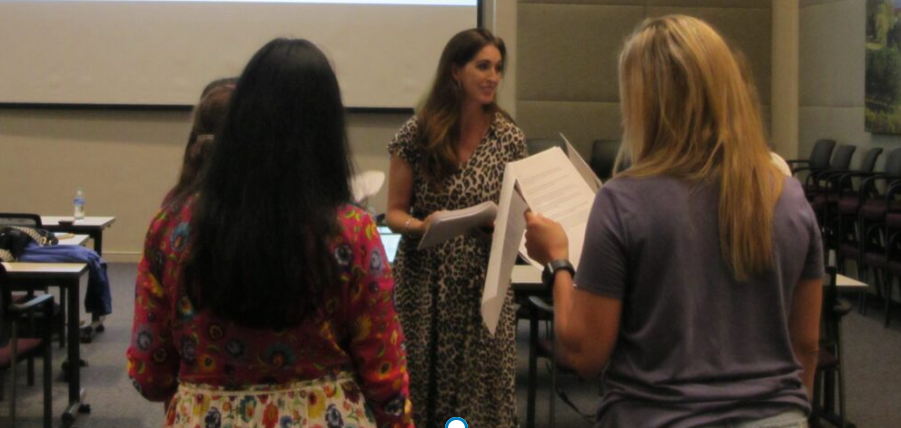Handouts/Materials
These materials can be used to plan instruction, elevate rigor, and increase cognitive demand.
STRETCH PROMPTS – A prompt chart download for analysis, problem solving, creative thinking for solutions, critical thinking, metaphorical thinking, debate, metacognition and transfer.
BUMPING UP BLOOM’S – A questioning guide to go “Beyond Bloom’s” taxonomy.
SCHEMA BOARD – An elevated Frayer Model, from Vertical Differentiation.
Other books and materials for purchase: Click here for Emily’s author and book page
Short Articles
What Makes Honors More Than a Name?
Many middle schools offer advanced, pre-AP, or honors classes in order to provide challenging learning experiences for students who demonstrate advanced readiness. Often, schools use strict criteria for students to get into these classes including test scores, grades, and teacher recommendations, but once students are placed in these classes, we see little differences in instructional approaches and curriculum compared to standard classes. Students in advanced classes might be assigned more homework, a different novel, a few additional “critical thinking” questions from the textbook, or a long-term project, but do these adjustments to the standard curriculum adequately challenge students?
Is There a Mindset Misconception with Giftedness?
Mindsets certainly matter in making strides towards achievement, but when its oversimplification is used to deny the uniqueness of being gifted, its misconception could unfortunately mask the gift.
CHECKing on Your Child’s Emotions
What can we say to our children or students when they are grappling with a frustration? This short article shares guidance for coaching students to be self-aware and self-manage their emotions in response to stress and setbacks.
Webinars and Podcasts
Collaboration and Coaching in Gifted Education (Emily Mofield & Vicki Phelps) – They’ll Be Fine Podcast
In this podcast, Emily Mofield and Vicki Phelps discuss how collaboration and coaching in gifted education can facilitate talent development as part of a contiuum of serviced in gifted education.
Spotlight – Differentiation for High-Potential Students https://rss.com/podcasts/ncagtpodcast/742671/
In this podcast, Emily Mofield shares instructional strategies that can be used to “bump up” the rigor and the challenge within educational activities.
Podcast- True Grit – Fostering Tenacity and Resilience
When we don’t provide a challenge for our gifted kids at school and let them fly under the radar, they can develop internal monologues that equate being smart with everything being easy. Emily Mofield and Megan Parker Peters, authors of “Teaching Tenacity, Resilience, and a Drive for Excellence,” on episode 24 of Mind Matters/Neurodiversity.
Webinar- Cultivating Resilience
In this webinar for NAGC, Dr. Emily Mofield and Dr. Megan Parker Peters discuss cultivating resilience among gifted students.
Research Articles & Book Chapters
A collection of Mofield’s research articles is available on Google Scholar, with over 1,000 citations to date. Selected full-text articles are featured below:
Research Articles
4C Honors Framework: Defining Features for Advanced Coursework in Secondary Schools (Mofield, 2025)- Gifted Child Today
Crafting Expertise: Developing Talent in English Language Arts (Stambaugh, Covington, and Mofield, 2025)- Gifted Child Quarterly
Examining Students’ Perceptions of Giftedness, Need for Cognition, and Goal Orientations (Parker Peters & Mofield, 2024)-Journal of Education for the Gifted
Considerations for Professional Learning Supporting Teachers of the Gifted in Pedagogical Content Knowledge (Weber & Mofield, 2023).- Gifted Child Today
Understanding the Interplay of Psychosocial Competencies in Talent Development: Typologies and Differences for Gifted Students (Mofield & Parker Peters, 2022)- Roeper Review
Benefits and Barriers to Collaboration and Co-Teaching: Examining Perspectives of Gifted Education Teachers and General Education Teachers (Mofield, 2020)-Gifted Child Today
Applying a Christian Perspective to Educating Gifted Students through Talent Development Framework (Mofield & Mofield, 2021)- International Journal of Christianity and Education
Understanding Underachievement: Mindset, Perfectionism, and Achievement Attitudes Among Gifted Students (Mofield & Parker Peters, 2019)-Journal for the Education for the Gifted
Mindset Misconception? Comparing Mindsets, Perfectionism, and Attitudes of Achievement in Gifted, Advanced, and Typical Students (Mofield & Parker Peters, 2018)- Gifted Child Quarterly
Shifting the Perfectionistic Mindset: Moving to Mindful Excellence (Mofield & Parker Peters, 2018)- Gifted Child Today
Perfectionism, Coping, and Underachievement in Gifted Adolescents: Avoidance vs. Approach Orientations (Mofield, Parker Peters, and Charkraborti-Ghosh, 2016)- Education Sciences
The Relationship Between Perfectionism and Overexcitabilities in Gifted Adolescents (Mofield & Parker Peters, 2016)- Journal for the Education of the Gifted
Multidimensional Perfectionism Within Gifted Suburban Adolescents: An Exploration of Typology and Comparison of Samples (Mofield & Parker Peters, 2015)-Roeper Review
Addressing Multidimensional Perfectionism in Gifted Adolescents With Affective Curriculum (Mofield & Chakraborti-Ghosh, 2010)- Journal for the Education of the Gifted
Book Chapters
Teaching Psychosocial Skills and Modeling Habits of Achievement (Mofield, 2022) In Unlocking Potential.
Engaging Gifted Teachers in Professional Learning about Content Curriculum (Weber & Mofield, 2021) in Best Practices for Profesional Learning & Teacher Preparation.
Concept-Based Curriculum Design and Practice in the United States (Stambaugh & Mofield, 2017) in Curriculum for High-Ability Learners.

